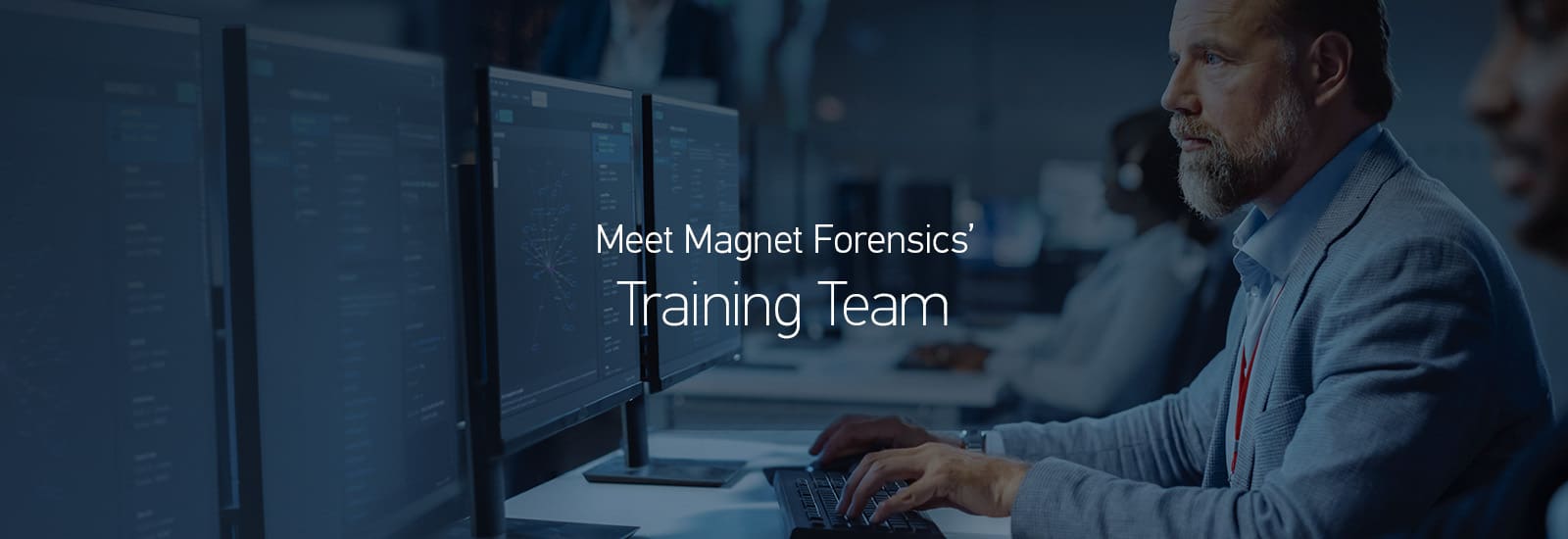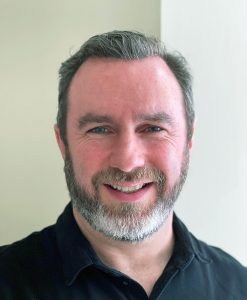
Meet the Magnet Forensics’ Training Team: Simon Coles
Introducing our newest member of the Training Team, Simon Coles.
Simon joins from a background in UK law enforcement. He loves being a Trainer and sharing his knowledge with those around him. Read on below!
Want to learn more about what courses are offered? Visit our Training & Certification page for more information.
MF: Tell us about your life before becoming a Trainer.
SC: Prior to becoming a trainer at Magnet Forensics I was a police officer in England for sixteen years, most of which was as a detective. In 2012 I started working on complex large value fraud cases and a couple of years later this included computer crimes such as hacking and employee computer misuse. As a Detective Sergeant I set up the Cyber Investigation team in my local police force and we had a very successful few years investigating email compromises, website defacements and hacking.
MF: What made you want to be a Trainer?
SC: A significant part of my last job in law enforcement was making sure fellow investigators knew the software we had at our disposal and how to get the best from it. I have always been enthusiastic about sharing my knowledge with people during my time with law enforcement. Not everyone is in the fortunate position to have time to explore different solutions to their challenges and I get a great buzz out of helping others to work smarter and more effectively through sharing my skills.
MF: What type of training have you taken part in personally? What is your favorite part of the role?
SC: I have completed training certified by GCHQ (the UK’s intelligence services) around cybercrime investigation and I’ve successfully passed CompTIA’s Security+ exam, ISC(2) CISSP, and EC Council’s Certified Ethical Hacker. I also was fortunate enough to have a Magnet Forensics Training Annual Passport (TAP) and so I got to undertake most Magnet courses culminating in passing my MCFE exam. The field is always evolving and developing and I find it fascinating to see the new technologies emerge and what information can be gathered from knowing where to look – the heart of any investigator!
MF: What excites you the most about a new class?
SC: I always enjoy getting to know a class and the diverse background of people that brought them to the class. Magnet allows me to meet people all over the world from so many varied backgrounds and listen to the ways they have been working and giving them information so they can get the most out of the software tools at their hands.
MF: Do you ever learn anything from the students?
SC: The field of digital forensics is so vast that everyone can bring something to each class. They might have experienced some new hardware not seen before, or a knew technique used by criminals that can be uncovered to provide evidence people didn’t know was there before. The friendly nature of the classes opens people up to share experiences which benefits everyone.
MF: Is there a particular moment that stands out the most to you in your career in the classroom?
SC: Sometimes there can be an issue that a student has been putting up with for a long time because there was no other way around it. Revealing the solution to their problem and seeing their relief at now doing the task effectively – knowing you’ve made that person’s life a whole lot easier is a great feeling.
MF: What do students get out of training in person that they can’t get on their own?
SC: Working on their own can suit some people who prefer to go at their own pace but they miss out on sharing knowledge and experience with other students and being able to ask on-the-fly questions around their understanding as they go, whenever they arise. The fluid nature of the courses mean that we are always able to have a break-away chat about a particular subject as it comes about which enriches the learning.
MF: How prepared do you feel students are to use Magnet Forensics products after taking the training course?
SC: The students get to see how the products fit into a case study and how to apply to tools to uncover the evidence in the case. Many students use the skills we teach to go over existing cases again with their new skills. The courses holistically prepare the students for using Magnet Forensics products.
MF: What is most unique about Magnet Forensics’ approach to training?
SC: Magnet sets itself apart in training by really caring what the students want from each course, rather than rigidly delivering static material. The interactive nature of the courses is what appealed to me before I joined the team. The knowledge flow really is two way. I remember a fellow student asking a trainer whether the product had a rather unusual feature they were looking for. Within a few weeks – it did, based on this request! As the students learn how to expertly use the products, Magnet learns what the students need and delivers it.
MF: Why do you think certification is important to examiners?
SC: The goal of certification is to formally recognise the effort and level of knowledge attained by the individual. The ability to prove to another party that the individual has reached a required standard is pivotal in the trust placed in them to forensically examine digital media.
MF: How do you manage to keep up on the latest trends in digital forensics?
SC: I follow a variety of news feeds, and include Reddit, YouTube and various podcasts to which I subscribe. There is always a new paper to read on an exploit or technical release as the field develops. It’s incredible what people can uncover through careful, meticulous study!
MF: What trends do you see coming down the pipeline in digital forensics?
SC: I believe digital forensics will continue to refine the use of Artificial Intelligence/Machine Learning methodologies to really pull apart acquired data and enhance pattern recognition while reducing false positives. There will still be a requirement for an expert examiner to review the material, but streamlining the preparatory work and making it easier for the examiners to highlight key material will be a key driver in many forensic labs. Also the data we can retrieve from cloud environments will continue to increase exponentially as their usage becomes even more pervasive and entwined through our everyday life.
Thank you, Simon! Welcome to the Training team and to Magnet Forensics overall—we look forward to seeing your future contributions.
Read our previous interviews with VP Training Chuck Cobb, Director of Training Operations Jamey Tubbs, Chris Vance, Patrick Beaver, Doug Estes, Lyn Goh, Larry McClain, Hoyt Harness, Jerry Hewitt, Chris Blight, Erich Schmidt, and Justin Almanza.
Click here to go to the Magnet Forensics Training and Certification Portal.
